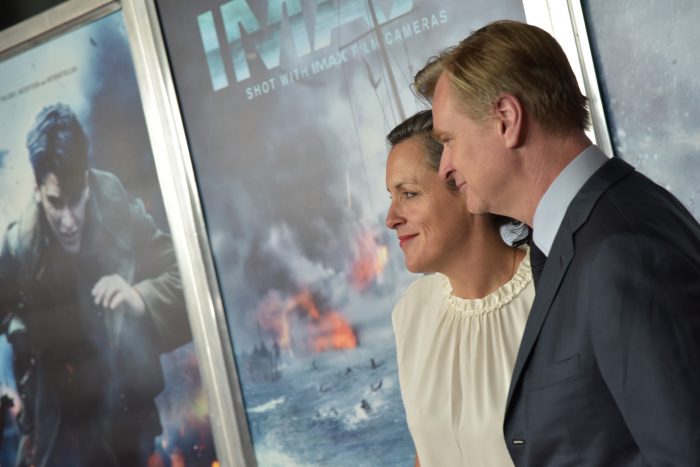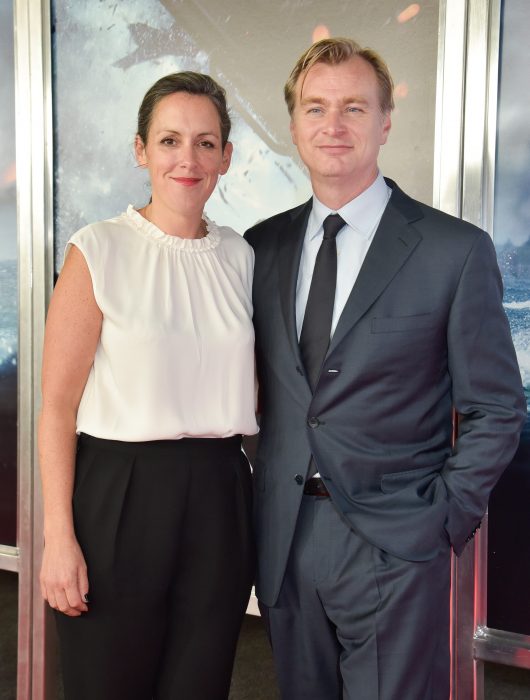The special screening was held at the National Air and Space Museum.

Producer Emma Thomas and Director Christopher Nolan attend a special screening of DUNKIRK at the Smithsonian National Air & Space Museum’s Lockheed Martin IMAX Theater on Wednesday, July 19, 2017 in Washington, DC. (Photos by Kris Connor/Warner Bros. Pictures)
Christopher Nolan’s new film ‘Dunkirk’ premiered on July 21, and the long-awaited wartime action blockbuster is yet another huge success for the three-time Oscar winning director. War veterans, members of Congress and other Washington elites were joined by Nolan and producer Emma Thomas for a private IMAX screening at the National Air and Space Museum.
Hollywood’s most creative duo walked the red carpet with much poise and elegance. When asked to describe the making of ‘Dunkirk,’ Nolan answered precisely and profoundly.
“We’ve tried to shift and advance the grammar of the blockbuster movie storytelling of film,” he explained. “With every film you bring to the market, you try to advance the conversation a little bit and make something new. This film has a very extreme, immersive quality to it. It’s very subjectively told. The real aggression between the level of suspense and intensity and how long we tried to maintain that are things that we’ve tried to put in the film. I hope that people will see that this film is something different.”
There are many components that are different in this film. A strong emphasis on visual and sound effects speaks louder than any other war movie. The simultaneous and intricate storytelling of the people on the land, in the air and at sea elevate the intensity of the battle. The director’s clever manipulation of time gives perspective to the soldiers lost in the moment during the fight. Most of all, Nolan’s attention to the emotional details of the film touch the hearts of the audience, as they are reminded of the real human impact of war.

Producer Emma Thomas and Director Christopher Nolan attend a special screening of DUNKIRK at the Smithsonian National Air & Space Museum’s Lockheed Martin IMAX Theater on Wednesday, July 19, 2017 in Washington, DC. (Photos by Kris Connor/Warner Bros. Pictures)
Alison Jaslow, the Executive Director of Iraq and Afghanistan Veterans of America (IAVA) was one of many attendees to praise ‘Dunkirk’ and Nolan’s talent.
“There is really no difference between what a soldier experiences today versus what a soldier experienced in World War II. It is more modern now, of course, but the emotional impact and the struggles you deal with — not understanding the strategy sometimes, the disconnect between you and your leadership — those things are timeless. It expands generations, it expands nationalities, and I am super impressed by Nolan and his team and how the detail really comes out in the film. If I can relate to it, he’s done a really good job.”
The “Miracle of Dunkirk” is the evacuation and survival story of over 300,000 soldiers who didn’t think they would make it home. It was the British’s effort to cut their losses and not turn their backs on their allies.
“The Battle of Dunkirk is a great example of something we should consider when we go to war,” Jaslow said. “Sometimes, we’re going to lose tens of thousands of troops and not even win that battle, but sometimes, the sacrifices that you have to make are beyond the human sacrifice to win a war.”
